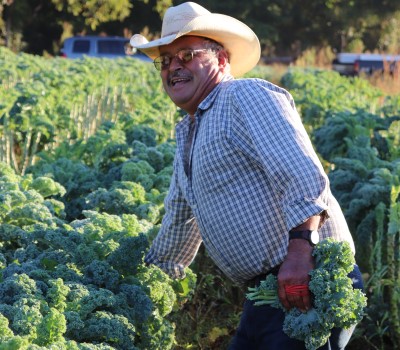Enjoy Fresh, Local Flavors All Winter Long!
Seasonal eating is at the heart of everything we do. It’s not just a trend – it’s a lifestyle that celebrates the natural rhythms of the earth. Every season brings its own bounty, and winter is no exception.
Thanks to our dedicated farmers, many of whom are still working in greenhouses or growing winter crops, you can enjoy fresh, nutritious foods even when the weather is cold. Our food artisans continue their craft throughout the winter too, bringing you tasty baked goods and other seasonal treats.
LOCAL FOOD = SUSTAINABLE FOOD
We all want to eat nutritious and eco-friendly food, but with so many labels out there, it can be overwhelming to know what’s best. While the “Certified Organic” label might seem like the answer, at Seasonal Roots, we focus on sustainable, local food over government labels. Here’s why:
- WE PARTNER WITH LOCAL FARMERS
Many of our farmers are family-owned operations with a long history of caring for their land, crops, and animals. They use sustainable, regenerative farming practices, like crop rotation, to ensure the soil remains healthy for future generations. While some may be certified organic, we prioritize the practices that promote long-term land health over certification labels. And whether or not they are organic, we work only with farmers who minimize pesticide use, and never with those who over-spray. - ORGANIC DOESN’T ALWAYS MEAN LOCAL
When food travels long distances, its carbon footprint grows, and it loses both flavor and nutritional value. At Seasonal Roots, we believe in eating as locally as possible. Many of our farmers grow food right here in Virginia, Maryland, and sometimes in eastern North Carolina. We call this truly local food. Even though we may partner with farmers in Florida during the winter to ensure you have access to quality produce, it’s still regional, and we ensure that everything is delivered fresh, without the need for flying. - WHAT DOES “LOCAL” REALLY MEAN?
“Local” isn’t a one-size-fits-all term, and it’s not always clearly defined. For us, “local” means food grown within a 150-mile radius of our delivery areas. Our farmers are based primarily in Virginia, Maryland, and eastern North Carolina, with a few trusted partners in Florida during the colder months. For those who prefer to eat only what’s grown in their immediate area, our regional produce is clearly labeled in our online market, so you can make the choice that’s right for you.
BENEFITS & USES of Winter’s Surprising Bounty
Below are some of the health benefits of seasonal eating. Even in winter, it’s amazing how much local produce farming is still going on! Most of it is grown in local fields and greenhouses. Some is grown further south, but still in our region.
Because all our produce is harvested nearby for home delivery, it’s packed with nutrients and flavor and really good for you. Much better than produce that has to travel a long way to the grocery store.
BEETS
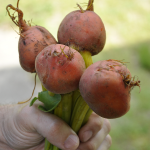 BENEFITS: Vitamin C, folate, potassium, magnesium, with antioxidant and anti-inflammatory properties.
BENEFITS: Vitamin C, folate, potassium, magnesium, with antioxidant and anti-inflammatory properties.
USES: Roast alone or with other root veggies as a side, or add to salads. Add to baked goods, like beet brownies, as a sweetener.
HARVEST: Year-round
BRUSSELS SPROUTS
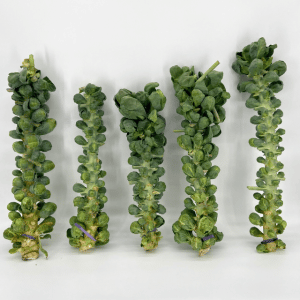 BENEFITS: Vitamin K, plus folate and iron.
BENEFITS: Vitamin K, plus folate and iron.
USES: Serve as a side or atop salads and meats, steam or roast, serve with salt or add tangy or savory sauces like balsamic vinegar.
HARVEST: September-March
CARROTS
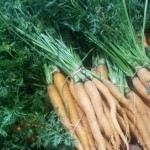 BENEFITS: Vitamin A, potassium, lutein, with antioxidant properties.
BENEFITS: Vitamin A, potassium, lutein, with antioxidant properties.
USES: Delicious raw or supercharge the sugars by roasting or grilling. Add to stews and soups. They even sweeten up baked goods like carrot cake.
HARVEST: Fall, winter, spring
KALE, COLLARDS, HYDRO BIBB LETTUCE, MICROGREENS
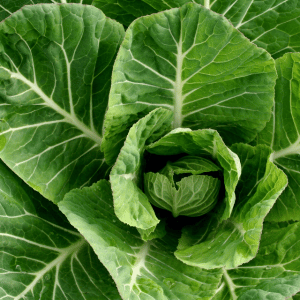 BENEFITS: Vitamins A, C, K, iron, and disease-fighting phytonutrients.
BENEFITS: Vitamins A, C, K, iron, and disease-fighting phytonutrients.
USES: Raw in a salad or smoothies, steamed as a stand-alone or baked into other dishes. Cooking makes it easier for our bodies to digest its nutrients.
HARVEST: Year-round, but it gets sweeter after the first nip from Jack Frost
LEEKS
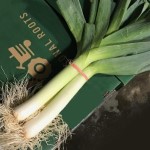 BENEFITS: Vitamin A, C, K, potassium, lutein, with antioxidant properties.
BENEFITS: Vitamin A, C, K, potassium, lutein, with antioxidant properties.
USES: Add this member of the onion family to stews, stuffings, and stir fries, or serve as a stand-alone side.
HARVEST: September-April
PARSNIPS
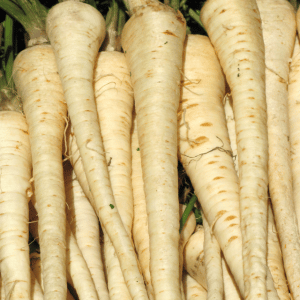 BENEFITS: Potassium, fiber.
BENEFITS: Potassium, fiber.
USES: Sweeter and nuttier than carrots, roast alone or with just about every other fall vegetable.
HARVEST: October-April
RUTABAGAS
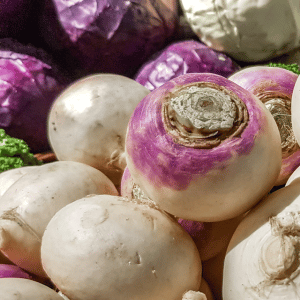 BENEFITS: Vitamin C, fiber.
BENEFITS: Vitamin C, fiber.
USES: Like a cross between a turnip and a parsnip, delish in casseroles, or puree with turnips and carrots for soup, or roast with ginger, honey, or lemon.
HARVEST: October-April
SWEET POTATOES
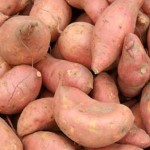 BENEFITS: Vitamin A, iron, with anti-inflammatory properties.
BENEFITS: Vitamin A, iron, with anti-inflammatory properties.
USES: Roast like a potato or cut up like fries, add to salads and stews, puree into soups. Best of all: Sweet potato pie!
HARVEST: September–December
TOMATOES (greenhouse)
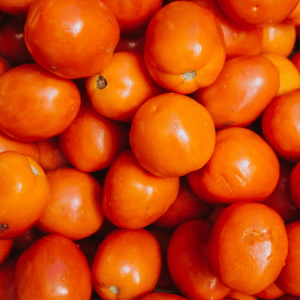 BENEFITS: Vitamin C, beta-carotene, potassium, phosphorus, with antioxidant properties.
BENEFITS: Vitamin C, beta-carotene, potassium, phosphorus, with antioxidant properties.
USES: Add to salads, sandwiches, sauces, stews, stir fries, kabobs, pizza, or just enjoy them plain with a little salt.
HARVEST: Year-round
TURNIPS
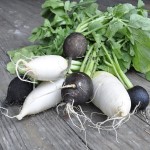 BENEFITS: Vitamin C (roots), vitamins A, K, folate (leaves).
BENEFITS: Vitamin C (roots), vitamins A, K, folate (leaves).
USES: Steam, roast, or boil the roots. Flavor with fennel, bread crumbs, or brown sugar. Adds a slightly bitter complement to sweet parsnips, carrots, or mashed potatoes — or mash them alone. Steam or stir fry the leaves.
HARVEST: September–April
WINTER SQUASHES
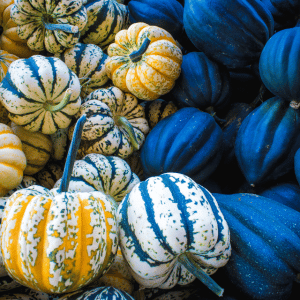 BENEFITS: Omega-3 fatty acids, vitamin A.
BENEFITS: Omega-3 fatty acids, vitamin A.
USES: Acorn, butternut, delicata and more have thick skins, and can be stored for months. Bake, steam, or roast plain or with cinnamon and ginger, add to salads and stews, puree into soups.
HARVEST: October–February
PLUS REGIONAL WINTER PRODUCE
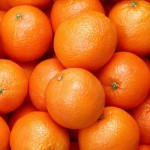 CITRUS (Oranges, Grapefruits, Tangerines): Rich in vitamins C, B, potassium, phosphorus, magnesium, with antioxidant and anti-inflammatory properties.
CITRUS (Oranges, Grapefruits, Tangerines): Rich in vitamins C, B, potassium, phosphorus, magnesium, with antioxidant and anti-inflammatory properties.
Also: Cucumbers, Peppers, Yellow Squash, Zucchini packed with vitamins A, C, E, K, magnesium, potassium, manganese, beta-carotene, and more.
About Seasonal Roots
Since 2011, Seasonal Roots’ online farmers market has connected Virginia families with local family farmers who use sustainable, humane practices. Our neighborhood market managers – who believe in living better through scrumptious, healthy eating, being kind to animals, protecting the environment, and spreading joy – home-deliver freshly harvested produce, pastured eggs, grass fed dairy and meat, plus artisan fare. We empower our members to eat better and live better with more nutritious, flavorful food that’s good for us and good for the planet. More info at seasonalroots.com.
